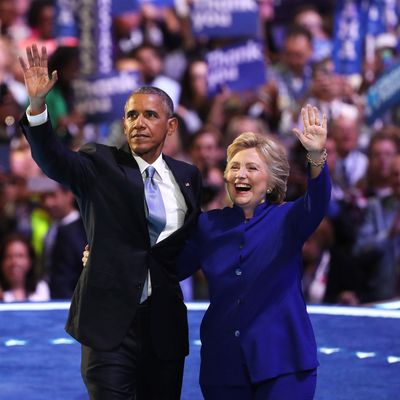
Barack Obama has long argued that America and its allies must “seek the peace and security of a world without nuclear weapons.” One of the signature foreign-policy achievements of his first term was forging a new Strategic Arms Reduction Treaty with Russia. This May, he became the first sitting U.S. president to visit Hiroshima and pay tribute to the victims of humanity’s first experiment in nuclear warfare.
These actions — combined with Obama’s broader reputation for relatively dovish foreign-policy instincts — has largely obscured the fact that his administration is pursuing a $1 trillion nuclear “modernization” program, which many experts think will only heighten the risk of atomic war.
The president’s plan involves breaking up America’s existing nuclear stockpile into smaller, more reliable weapons, including cruise missiles with nuclear tips. This allows Obama to maintain his pledge to create no “new nuclear weapons,” while developing a sleek, modern arsenal that will, somehow, further deter enemy nations from attacking the United States.
There are a few problems with this plan. For one thing, building more precise nuclear cruise missiles only makes their use “more thinkable,” in the words of former vice-chairman of the Joint Chiefs of Staff James E. Cartwright. What’s more, the move threatens to kick off a new round of nuclear proliferation, as Stephen Kinzer, a scholar of international relations at Brown University, recently observed:
Obama’s proposed “modernization” increases our vulnerability, not our security. The first and most obvious reason is that it will certainly lead other countries to seek equivalent arsenals of their own. It is especially upsetting to Russia, which already feels under increasing American threat as a result of our military maneuvers on its borders and the fact that many of our missiles are positioned in Germany, Turkey, and other countries near its territory. The Russian defense minister recently announced that in response to Obama’s plan, Russia will “bring five new strategic nuclear missile regiments into service.” China would surely match that escalation. If it does so, India will follow. Then Pakistan will jump into the race. It is a recipe for disaster.
Kinzer also notes that, since a nuclear cruise missile would be indistinguishable from a conventional one on radar, “an air defense controller in another country … would have no way of knowing whether [an incoming missile] was armed to destroy a building or an entire city. The temptation to launch nuclear retaliation could be irresistible.”
Finally, there’s the program’s exorbitant cost. At a time when deficit politics are constraining our government’s ability to invest in basic social services and infrastructure improvements, do we really need to spend $1 trillion on renovating weapons we don’t ever want to use?
Hillary Clinton, for one, thinks not.
Earlier this week, the Washington Free Beacon published an audio recording of a fundraiser Clinton held back in February, which was gleaned from the hack of a campaign staffer — reportedly, as part of the same hack that exposed DNC emails.
In that audio, Andrew C. Weber, a former Defense Department official, asks Clinton if she would cancel the nuclear-cruise-missile project, were she elected president.
“I certainly would be inclined to do that,” she replied. “The last thing we need are sophisticated cruise missiles that are nuclear-armed.”
Clinton went on to suggest that such weapons would likely encourage a nuclear arms race, and praised former Defense secretary William J. Perry for his public opposition to the modernization program.
“This is going to be a big issue,” Clinton added. “It’s not just the nuclear-tipped cruise missile. There’s a lot of other money we’re taking about to go into refurbishing and modernization … Do we have to do any of it? If we have to do some of it, how much do we have to do? That’s going to be a tough question, so I will look to people like you and Bill Perry to help me answer that question.”
Elsewhere in the recording, Clinton took a more “hawkish” stance on cybersecurity, suggesting the United States must deter attacks from China and Russia through retaliatory measures. Per the New York Times:
Though the administration never formally accused China of stealing the security-review records of nearly 22 million federal employees and contractors, she called the theft “a gold mine for Chinese intelligence.”
“They are at it all the time,” she said of the Chinese state-sponsored hackers. But she also seemed to suggest — more directly than she did in Monday night’s debate — that she thinks the best deterrent to the Russians, the Chinese, the Iranians and the North Koreans, all of whom she named, was a dose of American offensive cyberweaponry.
“They have physical assets that are also connected on the internet,” she said. “So they have to know we would retaliate. So that provides a certain level of deterrence.”
For now, foreign hackers seem decidedly undeterred. Which, in this one instance, might be for the best — these cyberwarriors just provided American voters with a clearer idea of Clinton’s views on nuclear weapons than her campaign ever did.






























